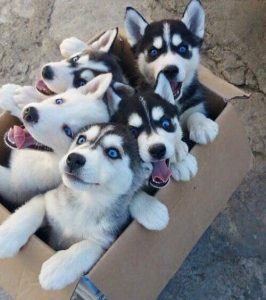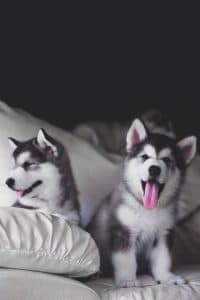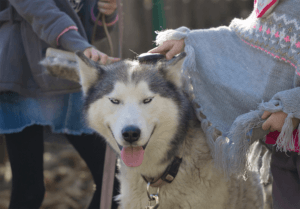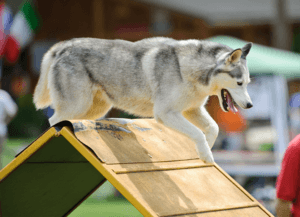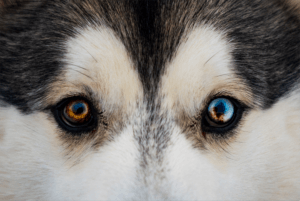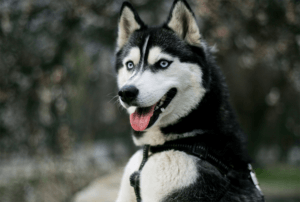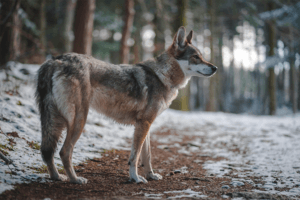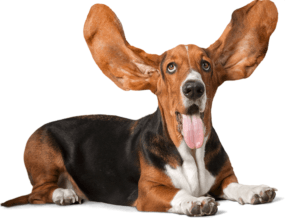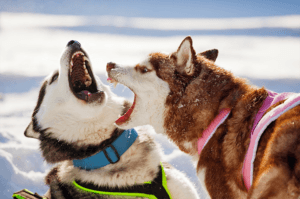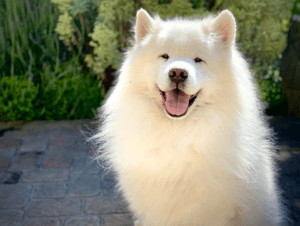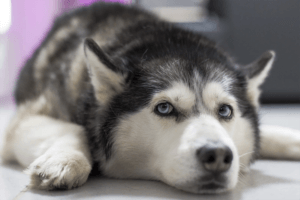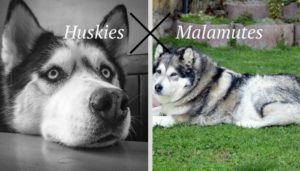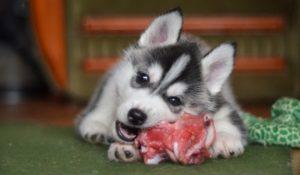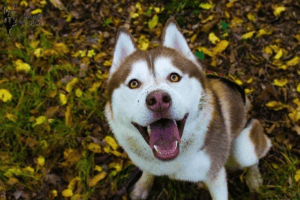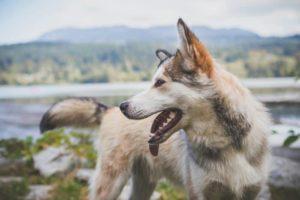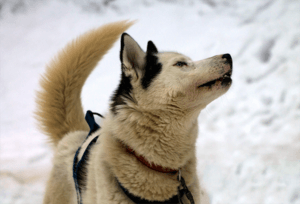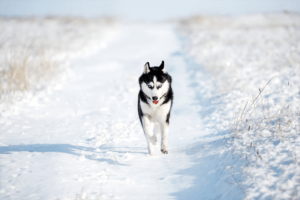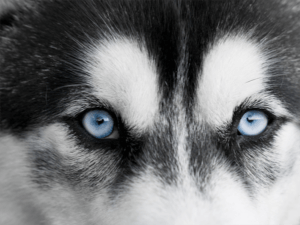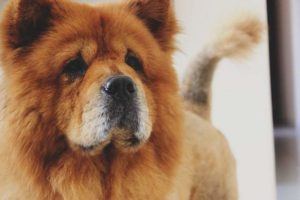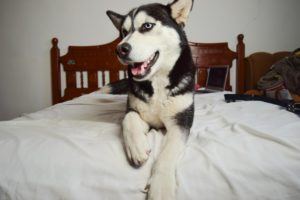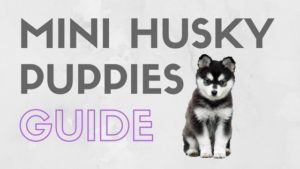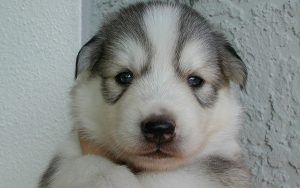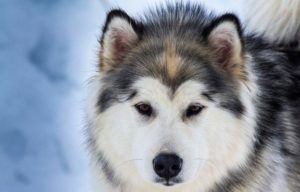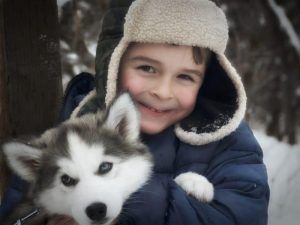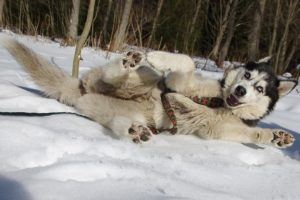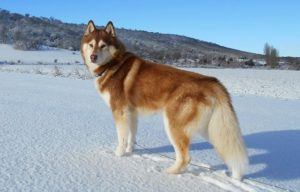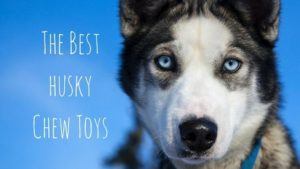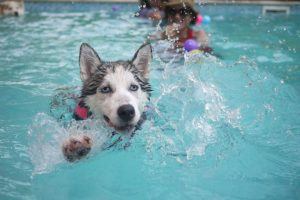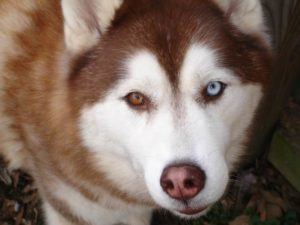Mini huskies are some of the cutest and quirkiest dogs in the world, and they make for excellent canine companions.
There are several reasons for owning a mini husky.
A mini Husky / miniature husky makes an excellent family pet particularly for families with young children where responsibility is required in terms of care and trainability.
Miniature Siberian huskies have a very similar personality to their full-sized counter parts, and they are just as adorable – albeit in a smaller stature! They can be quite cheeky at times, boisterous and very, very playful.
We’ve put together this complete guide to what you can expect from adopting a mini husky.
- Common Mini Husky FAQs
- Where do mini huskies come from?
- How big do mini huskies get?
- What color are mini huskies?
- What is the mini husky temperament and personality?
- How long do mini huskies live for?
- How much exercise do mini huskies need?
- Are mini huskies good with kids?
- Do mini huskies need much grooming?
- Do mini huskies bark a lot?
- Can mini huskies live in a hot country?
- Do mini huskies have any genetic problems?
- What age can I bring my mini husky puppy home?
- Learn More About Owning a Mini Husky
Common Mini Husky FAQs
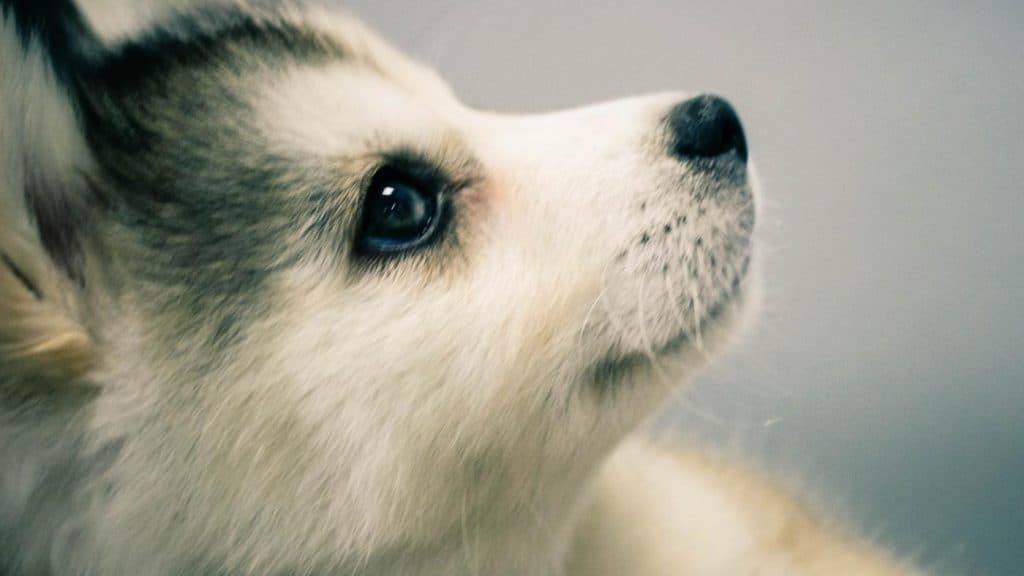
Where do mini huskies come from?
Miniature Siberian Huskies – also known as mini huskies – are simply normal Siberian huskies that have been bred to be much smaller than the breed standard.
They have all of the appearance and personality characteristics of the typical, full-sized Siberian husky but come in a much smaller and more manageable package – around half the size.
The Kennel Club don’t differentiate the mini husky as a different breed to the Siberian Husky, but instead classify it as a size variation. You can see more about the breed standard here.
Mini huskies were first bred in the 1990s by Bree Normandin, who wanted to achieve a companion-sized version of the full-size Siberian.
Need a name for your new best friend? Check out our guide to the most popular husky names.
How big do mini huskies get?
Height and weight of mini huskies vary widely according to the practices of individual breeders. The rule of thumb is that they should in all respects be simply smaller variations on the Siberian husky, with weight in proportion to their height.
All Siberian huskies that measure between 12 to 16 inches in height are regarded as miniature.
The weight of mini huskies is typically somewhere between 18 to 35 pounds for dogs and 15 to 30 pounds for bitches, according to the Miniature Siberian Husky Club of America.
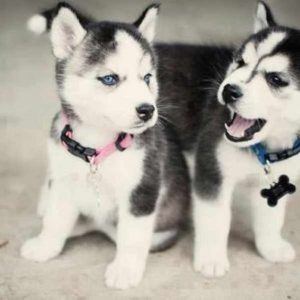
What color are mini huskies?
Just like the famous Siberian husky, mini huskies can be any color variation between black and white, and are known for their unusual patterns and markings over their bodies and heads.
Often the most striking thing about the husky appearance is the eyes, which can be brown or a piercing blue in color.
See more: our guide to husky colors and markings
What is the mini husky temperament and personality?
Mini huskies make for the perfect canine companions – as well as being very loyal, they’re known for their outgoing and friendly personalities and distinct lack of aggression.
They’re very alert too, although their friendly personalities mean that they don’t function particularly effectively as guard dogs.
As they age, mini huskies will become more dignified and rein in the playfulness of their younger years.
A word of warning, however delightful they are; much like their larger counterparts, mini huskies are full of energy and prone to mischief.
They need plenty of exercise, attention and supervision or otherwise could end up venting their unexpended energies in more destructive activities – heavy chewing, for instance, or even escape attempts.
Siberian huskies are classed within the working dog category and in some parts of the US are still used to pull sleds. While mini huskies may need a little more manpower, they are still very capable and athletic.
How long do mini huskies live for?
The average life span for a mini husky is somewhere between 12 and 14 years. Mixed breeds may enjoy a little longer.
How much exercise do mini huskies need?
Although mini huskies are lower maintenance in the exercise stakes than full size Siberian huskies, they still require daily exercise and plenty of playtime outside that.
Owners do manage to house mini huskies in small apartments or houses without yards, but extra care must be taken to ensure that they get their daily fix of activity regardless. If their energy is not expended, you may need to deal with behaviors like destructive chewing, digging or even escape attempts!
Make sure that you always keep your mini husky on a leash when you’re out and about – they’re known for being great runners that can cover huge distances so you’ll always want to keep them pretty close.
You can read more about the best exercise for mini huskies here.
Are mini huskies good with kids?
Thanks to their gentle, intelligent and friendly personalities, mini huskies are a good fit for households with children although it’s imperative to ensure that all play is supervised as huskies can be quite high energy dogs.
If you want to really assimilate your kids with your mini husky, it’s a good idea to get your child involved in any training programme you’re using with your dog. This will allow both child and dog to build up their trust towards each other and become lifetime pals while doing so!
Just make sure to always supervise any one-on-one time.
Do mini huskies need much grooming?
Huskies are very good self-groomers and are relatively low maintenance when it comes to clipping and grooming.
They do have a double coat, however: this is comprised of a dense undercoat and long-haired topcoat designed to keep them warm in bad weather and low temperatures. It’s likely that your mini husky will shed this hair throughout the year, particularly if you live in a more temperate climate, together with a heavy shedding season in the Spring.
In order to keep the shedding minimal and manageable, it’s a good idea to invest in a good brush to use on your mini husky at least once a week, as well as a suitable vacuum for pet hair.
The brush will help remove any dead hair before it falls off and gets entangled in your carpets.
(We’d recommend the Furminator.)
They do not require many baths – see here: how often should you bathe a husky?
Do mini huskies bark a lot?
Mini huskies aren’t aggressive guard dogs so it’s unlikely that you’ll hear too much barking from them.
When they do bark, however, they tend to sound much more like their wolf ancestors than a normal dog: they will howl instead.
While this may be a little disconcerting the first few times you hear it, you’ll get used to it quickly. You’ll find many other husky owners have a howling dog too!
Can mini huskies live in a hot country?
Mini huskies are remarkably adaptable animals that can live a happy life in a hotter climate – hence why so many of them can survive away from the Siberian climate they were initially bred in!
You will need to be particularly careful that your mini husky doesn’t overheat or become dehydrated, however. Make sure to keep them topped up with plenty of water and access to shade – it may even be a good idea to invest in a small toddler splash pool in your yard to keep them cool.
They will require less of their heavy double coat in hot weather so are likely to shed more hair than they would do in the cold. Make sure to brush them daily to keep the fall-out minimal.
Whatever you do, don’t be tempted to shave your mini husky’s coat in the hot weather – the dense underlayer helps to regulate their temperature even in hot weather, while you could expose them to sunburn if their skin is exposed.
It’s also wise to be liberal with the air-conditioning when you have a mini husky – try and ensure that they’re as cool and comfortable as possible. It’s best to give them short and sharp bursts of exercise, rather than walking them for an extended period, so they don’t get fatigued and overheated.
Do mini huskies have any genetic problems?
Mini huskies are vulnerable to the same genetic problems as full-size Siberians, although are generally a very healthy breed.
Eye problems are not uncommon in Siberian huskies, including glaucoma and progressive retinal atrophy. Hip dysplasia is thankfully quite rare although other genetic conditions like laryngeal paralysis and seizures have been noted.
It’s very easy to overfeed a mini husky and, if they’re not getting adequate exercise, they can become overweight which carries additional health risks. They are ‘easy keepers’ requiring a small amount of food to thrive – just ensure that the food is high quality and protein based.
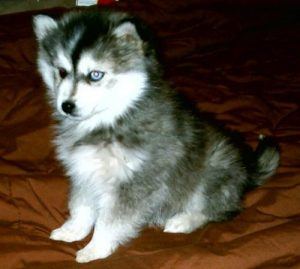
What age can I bring my mini husky puppy home?
Regardless of the breed, it’s widely accepted that the best time to bring a new puppy home is at the 8 week old mark.
At this age, your mini husky puppy will have had enough mother-pup bonding time, as well as pup-pup bonding time, and should be well enough socialized with other dogs for it not to be a problem when they meet other dogs later in life.
At 8 weeks old, your mini husky puppy will not have become too attached to their pup family and will be able to assimilate easily with their new family and make it their home.
A good breeder won’t allow puppies to be homed before the 7 or 8 week mark, and will spend time with the puppy beforehand laying the groundwork for training (which you will need to pick up the reins on when you get your puppy home).
Remember to find out from your breeder exactly what vaccinations your mini husky has already had and whether they have been dewormed yet.
See more: help me decide – should I get a husky?
Learn More About Owning a Mini Husky
As you will have no doubt spotted, this website is dedicated to the beautiful mini husky.
We love em!
We have a ton of guides that can help you get to know and understand your husky companion. Many of our articles touch on the full-size Siberian Husky, but given that they are the same breed (in smaller size), most of the advice still applies.
Browse through our dedicated husky owner guides below:

